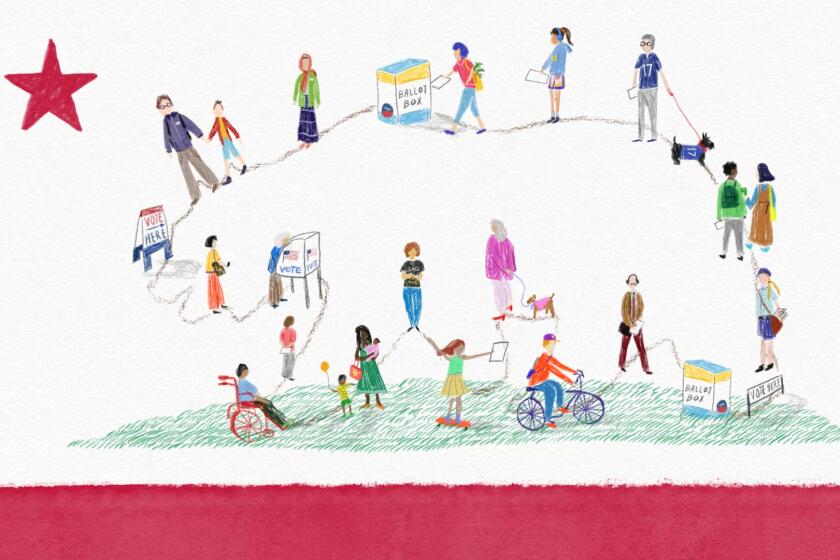Op-Ed: Should we tip online?
When the bill arrives at the end of a meal, we tip. No matter how terrible the service, no matter how tasteless the food, the standard is 15% to 20%. This is absurd, of course. A gratuity should be gratuitous. In most states, however, food-service wages fall below the federal hourly minimum, which means that servers and other staff rely on tips to make up the difference. And so ethical diners tip — usually not because the service was exceptional, but because they don’t want to be personally responsible for shorting someone’s paycheck.
Yet this code of consumer ethics rarely translates to services outside the restaurant world, even as the digital, on-demand economy puts more and more workers and artists in precarious positions.
Many of us stream music on Pandora or Spotify, which pays between $0.006 and $0.0084 per play to the person or company who holds the rights to that song. Last year a reporter for the Verge calculated that his personal most-played artist of the year, the band Built to Spill, netted just $2.24 from his Spotify listening. Although the math varies by artist and by streaming platform, in many cases the royalties are so low that if you haven’t purchased an album outright or paid to see an artist live, you essentially haven’t paid him. We keep listening.
Likewise, Uber users love it when the company slashes its fares, without really stopping to think that what’s cheap to the rider might be stingy to the driver. Uber and other ride-sharing apps make it difficult to tell how much of the fare the driver is actually pocketing. Sometimes even the drivers don’t have a clear picture of what they can expect to earn per shift. And, unlike in a restaurant, tipping is discouraged. We keep riding.
Most of us have hit a pay wall at the Los Angeles Times or the Washington Post or one of the many other publications that limits the number of articles available for free. And most of us haven’t heeded the pop-up ads asking us to subscribe — we just close the window, or search for the same article on a different device to avoid paying. Meanwhile, the Pew Research Center reports that newspapers have just experienced their “worst year since the recession and its immediate aftermath.” We’re not paying, but we keep reading.
Why do we tolerate the low-rate status quo when we’re ripping off artists, journalists and on-demand workers?
Why don’t we apply our restaurant standards to these other situations? Why do we tolerate the low-rate status quo when we’re ripping off artists, journalists and on-demand workers?
The research on tipping shows that social expectations contribute significantly to how much gratuity a person leaves. Under-tipping is a faux pas at best, a breakup-worthy offense at worst. How many embarrassed adult children have rushed back to the table to leave an extra few dollars, knowing that Dad left too little to prove a point? In a restaurant, you make eye contact with the server, and you’re often dining with friends who might notice if you choose to skimp.
Online, no one’s around to lift an eyebrow. There’s no social pressure to pay a fair rate for the news you read, the music you stream, the movies you watch, the rides you take. (Uber drivers are cut out of the payment process; it all happens via app.)
Adding a digital tip jar to each and every app and website is not a cure-all – there’s no one around to see us not use it. But it wouldn’t hurt. More transparency wouldn’t hurt, either.
It’s not always easy to figure out the extent of our obligations. We can tell ourselves that banner ads are compensating for the fact that we’re not subscribing (that’s not true, but we can tell ourselves that).
And if we’re not sure who is being hurt by our failure to pay — a faceless parent company, or an artist? — or how badly they’re suffering, we may not strain to correct our behavior.
Companies might as well try educating us when we use their products — and maybe even shaming us. What if the Washington Post called us out on Twitter when we hit their paywall? Or if Spotify allowed album purchases, then notified our playlist followers that we’d finally ponied up and paid the artist we’ve been streaming for free all these months?
In a restaurant, we accept that the price on our bill isn’t high enough to fairly compensate the people who have served us, so we voluntarily pay more than what’s strictly required. There’s no reason our online behavior should be any different.
Ann Friedman is a contributing writer to Opinion.
Follow the Opinion section on Twitter @latimesopinion or Facebook
More to Read
A cure for the common opinion
Get thought-provoking perspectives with our weekly newsletter.
You may occasionally receive promotional content from the Los Angeles Times.










